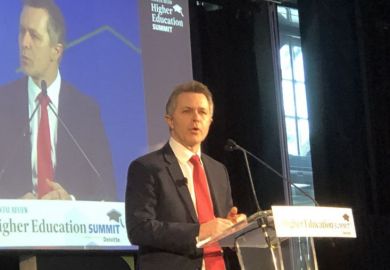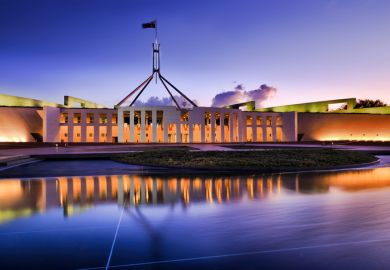Australian prime minister Anthony Albanese has conceded a need to put research funding on a more secure footing, after universities were largely overlooked during a week of high-profile policy ruminations.
In a speech to a Canberra conference organised by the Committee for Economic Development of Australia, Mr Albanese said the government needed to create “a sense of certainty and support for long-term projects” so that researchers and scientists could operate “without looking over their shoulder or spending their time reapplying for funding”.
“Government can’t be in the business of dictating breakthroughs or directing research, but it does have a vital responsibility to invest in our research agencies and universities, and to support…smart and skilled Australians who will lead this work,” he said.
Mr Albanese offered no details on how the government would boost research funding certainty, describing his proposal as a “cultural contribution”. The government could also help by “signalling a respect for science” and valuing “foundational” as well as commercial research, he said.
His comments emerged amid soul-searching within Australian academia about how to fund their research efforts, after Covid undermined an international education business thought to have bankrolled university research to the tune of at least A$3.3 billion (£1.9 billion) a year.
The Labor government is honouring a commitment to fund an extra 20,000 university places but has produced no concrete measures to address the research funding shortfall, although education minister Jason Clare acknowledged a “tension” in the financial reliance on international students.
“I’m not saying that that’s going to change overnight,” he told the Australian Financial Review Higher Education Summit in late August. “But I do think that the way funding works and the way in which research works generally should be part of an overarching accord.”
The Jobs and Skills Summit in early September produced relatively few measures to boost university teaching or research. While it may have given international education a shot in the arm, by granting an extra two years of post-study work rights to graduates of “select degrees in areas of verified skill shortages”, universities want more.
The Group of Eight has joined with the Council of Capital City Lord Mayors in lobbying for an Australian version of the UK’s high potential individual visa, and for extended post-study work rights to become “a pathway to permanent residency”.
Meanwhile, universities appear destined to be bit players in the new agency being established to monitor and advise on skills shortages and workforce training needs.
A Senate committee’s report on the foundational legislation for Jobs and Skills Australia acknowledged university groups’ arguments for higher education’s “explicit inclusion” in the agency’s remit but did not recommend any changes to the bill.
Register to continue
Why register?
- Registration is free and only takes a moment
- Once registered, you can read 3 articles a month
- Sign up for our newsletter
Subscribe
Or subscribe for unlimited access to:
- Unlimited access to news, views, insights & reviews
- Digital editions
- Digital access to THE’s university and college rankings analysis
Already registered or a current subscriber?








